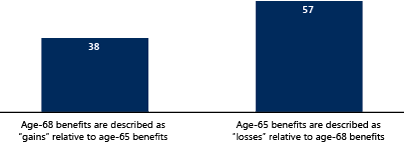Retirement Age Expectations Affect the Retirement Decision
April 2013A "usual retirement age" can serve as a reference point
Research has shown that 62 and 65 are the ages most frequently reported as being the "usual retirement ages" (URAs). In one study, only about 13 percent of participants reported an age other than 62 or 65 as being the URA, or the age at which people "who work with you or have the same kind of job" retire. 1
The reference point can shape individuals' retirement preferences
If people are used to hearing that 62 is "the retirement age," as opposed to it being the "early retirement age," convincing them to wait past age 62 to claim benefits may be difficult, because 62 has become the anticipated retirement age—the reference point. 2
Depending on the reference point, individuals interpret different outcomes as "gains" or "losses," which can affect claiming age preferences
One analysis 3 showed that when claiming benefits at age 65 was described as resulting in a loss from an age-68 reference point, more people preferred to claim at age 68 than when claiming benefits at age 68 was described as a gain from an age-65 reference point.
Thus, the language used to describe the benefit claiming decision can shift retirement expectations and preferences toward early or delayed retirement.

NOTES: All content is simplified for presentation. Please see source material for full details and caveats.
The findings and conclusions presented in this summary are those of the authors and do not necessarily represent the views of the agency.
Background
- Individuals' expectations about retirement can have important consequences for their retirement decisions. 4
- For example, expectations can lead to the establishment of reference points. 5
- Reference points can change how individuals interpret outcomes, including those involving Social Security claiming ages. 2
- This shift in interpretation occurs because individuals evaluate options relatively as gains or losses from a specified reference point.
Key Terms
- Loss refers to a reduced monthly benefit for claiming early.
- Gain refers to an increased monthly benefit for delaying claiming. 6
1 Brown, Charles. 2006. "The Role of Conventional Retirement Age in Retirement Decisions." Working Paper No. WP 2006-120. Ann Arbor, MI: University of Michigan Retirement Research Center.
2 Knoll, Melissa A.Z. 2011. "Behavioral and Psychological Aspects of the Retirement Decision." Social Security Bulletin 71(4): 15–32.
3 Fetherstonhaugh, David, and Lee Ross. 1999. "Framing Effects and Income Flow Preferences in Decisions about Social Security." In Behavioral Dimensions of Retirement Economics, Chapter 6. Washington DC: Brookings Institution Press and Russell Sage Foundation.
4 Lusardi, AnaMaria. 1999. "Information, Expectations, and Savings for Retirement." In Behavioral Dimensions of Retirement Economics, Chapter 3. Washington DC: Brookings Institution Press and Russell Sage Foundation.
5 Kahneman, Daniel, and Amos Tversky. 1979. "Prospect Theory: An Analysis of Decision under Risk." Econometrica 47(2): 263–292.
6 Lifetime benefits should be about the same for anyone living to the average life expectancy, regardless of when they claim retirement benefits (between the ages of 62 and 70).